![]()
Summer 2014 | Middle East Quarterly, Volume XXI: Number 3 | by Efraim Karsh
The Palestinian leadership’s serial rejection of the numerous opportunities for statehood since the Peel Commission report of 1937 casts a serious doubt on its interest in the creation of an independent state. Instead of engaging in the daunting tasks of nation-building and state creation, all Palestinian leaders without any exception — from the Jerusalem mufti Hajj Amin Husseini, who led the Palestinian Arabs from the early 1920s to the late 1940s; to Yasser Arafat, who dominated Palestinian politics from the mid-1960s to his death in November 2004; to Mahmoud Abbas — have preferred to immerse their hapless constituents in disastrous conflicts that culminated in their collective undoing and continued statelessness. At the same time, of course, these leaders have lined their pockets from the proceeds of this ongoing tragedy.
It can be shown that the main sources of this self-destructive conduct are pan-Arab delusions, Islamist ideals, and the vast financial and political gains attending the perpetuation of Palestinian misery.
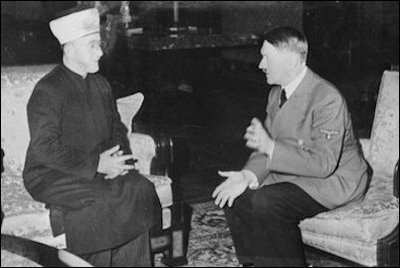
Jerusalem mufti Hajj Amin Husseini (left), in one of his letters to Hitler (right), did not speak of Palestinian aspirations, but rather, pan-Arab goals: “[T]he Arab people … confidently expects that the result of your final victory will be their independence and complete liberation, as well as the creation of their unity, when they will be linked to your country by a treaty of friendship and cooperation.”
Pan-Arab Delusions
In discussions of the history of the Arab-Israeli conflict, it is rarely acknowledged that, as products of the Ottoman imperial system where religion constituted the linchpin of the sociopolitical order of things, Palestinian Arab leaders during the British mandate era (1920-48) had no real grasp of the phenomenon of nationalism, hence, had no interest in the evolution of a distinct Palestinian nation. Instead they were wedded to the pan-Arab dream of a unified “Arab nation” (of which “Palestine” was but a tiny fragment) or the associated ideology of Greater Syria (Suriya al-Kubra), stressing the territorial and historical indivisibility of most of the Fertile Crescent.
As early as October 1919, Musa Kazim Husseini, a former Ottoman official, elected Jerusalem mayor under the British, told a Zionist acquaintance that “we demand no separation from Syria.”[1] Six months later, in April 1920, his peers instigated the first anti-Jewish pogrom in Jerusalem — not in the name of Palestine’s independence but under the demand for its incorporation into the (short-lived) Syrian kingdom headed by Faisal ibn Hussein of Mecca, the celebrated hero of the “Great Arab Revolt” against the Ottoman Empire and the effective leader of the nascent pan-Arab movement. Four years later, in a special report to the League of Nations, the Arab Executive Committee (AEC), the umbrella organization of the Palestinian Arabs, still referred to Palestine as the unlawfully severed southern part of “the one country of Syria, with its one population of the same language, origin, customs, and religious beliefs, and its natural boundaries.”[2] And in June 1926, the league’s permanent mandates commission was informed of an Arab complaint that “it was not in conformity with Article 22 of the Mandate to print the initials and even the words ‘Eretz Israel’ after the name ‘Palestine’ while refusing the Arabs the title ‘Surial Janonbiah‘ [‘Southern Syria’].”[3]
In July 1937, the Arab Higher Committee (AHC), the AEC’s successor, justified its rejection of the Peel Commission’s recommendation for the partition of Palestine on the grounds that “this country does not belong only to [the] Palestine Arabs but to the whole Arab and Muslim Worlds.”[4] As late as August 1947, three months before the passing of the U.N. resolution partitioning Mandate Palestine into Arab and Jewish states, the AHC’s mouthpiece al-Wahda advocated the incorporation of Palestine (and Transjordan) into “Greater Syria.”[5]
Hajj Amin Husseini himself never acted as a local patriot seeking national self-determination but rather as an aspiring pan-Arab regional advocate. An early admirer of the “Greater Syrian” ideal, he co-edited the Jerusalem-based newspaper Suria al-Janubiyya and presided over the city’s Arab Club, which advocated Palestine’s annexation to Syria. He cast his sights much higher after fleeing the country in 1937 to avoid arrest by the British for the instigation of nationwide violence: Presenting himself to Hitler and Mussolini as a spokesman for the entire “Arab nation,” Husseini argued that the Palestine problem necessitated an immediate solution not because of the national aspirations of the Palestinian Arabs but because it constituted “an obstacle to the unity and independence of the Arab countries by pitting them directly against the Jews of the entire world, dangerous enemies, whose secret arms are money, corruption, and intrigue.” His proposed solution, therefore, was not Palestinian statehood but “the independence of [unified] Palestine, Syria, and Iraq” under his leadership. As he put it in one of his letters to Hitler,
“[T]he Arab people, slandered, maltreated, and deceived by our common enemies, confidently expects that the result of your final victory will be their independence and complete liberation, as well as the creation of their unity, when they will be linked to your country by a treaty of friendship and cooperation.”[6]
While the young generation of diaspora Palestinian activists who began organizing in the 1950s with a view to avenging the 1948 “catastrophe”of the creation of Israel did not share the mufti’s grandiose ambitions, they were no less committed to the pan-Arab ideal as evidenced by the name of the first “resistance” group — the Arab Nationalist Movement (ANM). The pan-Arab ideal was also evident in the diverse composition of the movement comprising Palestinian (e.g., George Habash, Wadi Haddad) and Arab activists (notably Hani Hindi, scion of a respected Damascene family).[7]
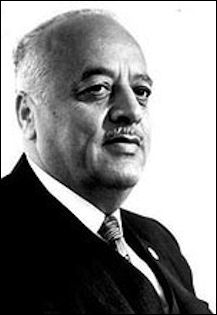
Ahmad Shuqeiri, a Lebanon-born politician of mixed Egyptian, Hijazi, and Turkish descent, became the founding chairman of the Palestine Liberation Organization. But in May 1956, he told the U.N. Security Council, “Palestine is part and parcel in the Arab homeland,” adding that Palestine “is nothing but southern Syria.”
Another prominent adherent to the pan-Arab ideal was Ahmad Shuqeiri, a Lebanon-born politician of mixed Egyptian, Hijazi, and Turkish descent, who served as the Arab League’s deputy secretary-general and as the Syrian and Saudi delegate to the U.N. before becoming, on May 28, 1964, the founding chairman of the Palestine Liberation Organization (PLO), established that day by the Arab states at the initiative of Egyptian president Gamal Abdel Nasser.
“Palestine is part and parcel in the Arab home-land,” Shuqeiri told the U.N. Security Council on May 31, 1956: “The Arab world is not prepared to surrender one single atom of their right to this sacred territory.” Clarifying to which part of the “Arab homeland” this specific territory belonged, he added that Palestine “is nothing but southern Syria.” In his account, “the Palestine area was linked to Syria from time immemorial” and “there was no question of separation” until the great powers brought this about by creating mandates under the League of Nations, with Britain controlling Palestine and France administering Syria.[8]
Against this backdrop, it is hardly surprising that the PLO’s hallowed founding document, the Palestinian Charter (download this Charter here in PDF), adopted upon its formation and revised four years later (download the revised version here in PDF) to reflect the organization’s growing militancy, has little to say about the Palestinians themselves. Devoting about two-thirds of its thirty-three articles to the need to destroy Israel, it defines the Palestinians as “an integral part of the Arab nation” rather than a distinct nationality and vows allegiance to the ideal of pan-Arab unity — that is to Palestine’s eventual assimilation into “the greater Arab homeland” — while seeking to harness this ideal to its short-term ends:
The destiny of the Arab Nation and, indeed, Arab existence itself depend upon the destiny of the Palestinian cause. From this inter-dependence springs the Arab nation’s pursuit of, and striving for, the liberation of Palestine. … Arab unity and the liberation of Palestine are two complementary objectives, the attainment of either of which facilitates the attainment of the other. Thus, Arab unity leads to the liberation of Palestine, the liberation of Palestine leads to Arab unity; and work toward the realization of one objective proceeds side by side with work toward the realization of the other.[9]
Even the November 1988 “declaration of independence” by the Palestine National Council, the PLO’s “parliament,” while obviously endorsing the idea of Palestinian statehood (in language that massively plagiarized Israel’s proclamation of independence),[10] vows allegiance to the pan-Arab ideal by describing the “State of Palestine” as “an integral part of the Arab nation, of its heritage and civilization and of its present endeavor for the achievement of the goals of liberation, development, democracy and unity.”[11]
As late as 2002, eight years after the establishment of a PLO-dominated Palestinian Authority (PA) in the West Bank and the Gaza Strip to lay the groundwork for Palestinian statehood in these territories, the prominent Israeli Arab politician Azmi Bishara, founding leader of the nationalist Balad Party (with seats in the Israeli parliament since 1999), asserted that “my Palestinian identity never precedes my Arab identity.… I don’t think there is a Palestinian nation, there is [only] an Arab nation.… Palestine until the end of the nineteenth century was the southern part of Greater Syria,” and the idea of a distinct Palestinian nation is a “colonialist invention” that happens to coincide with the consistent Israeli attempt, by both left- and rightwing parties, to ignore the reality of pan-Arab nationalism.[12]
While such plain speaking is hardly commonplace in PLO/PA current rhetoric, these words help explain the group’s continued subscription to the pan-Arab ideal as evidenced by its deliberate failure to revise the Palestinian Charter so as to acknowledge the distinctness of Palestinian nationalism; the frequent articulation of pan-Arab themes by its tightly controlled media; its constitutional definition of the prospective state of Palestine as “part of the Arab homeland” committed to the “goal of Arab unity”;[13] and the steady reiteration of the claim that the Palestinians are not fighting for their own corner but are rather the Arab nation’s “front line of defense.”[14] No less important, the PLO continues to subordinate its policies, and by extension Palestinian self-interest, to pan-Arab approval — and veto — as illustrated most recently by Abbas’s successful rallying of the Arab League behind his “absolute and decisive rejection to recognizing Israel as a Jewish state.”[15]
Upholding this position — sixty-six years after the creation of a Jewish state by an internationally recognized act of self-determination — effectively amounts to the rejection of Palestinian statehood for the simple reason that Israel would not self-destruct while the Palestinians and the Arab states are in no position to bring this about.
Islamist Imperial Dreams
If subscription to the pan-Arab dream has made the Palestinian cause captive to inter-Arab machinations, stirring unrealistic hopes and expectations in Palestinian political circles and, at key junctures, inciting widespread and horrifically destructive violence that has made the likelihood of Palestinian statehood ever more remote, adherence to Islamist ideals has subordinated Palestinian identity to the far wider ambition of Islamic world domination.
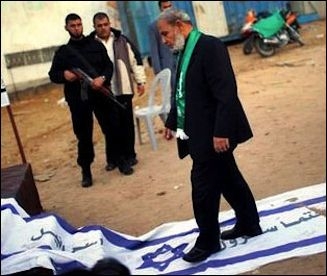
Palestinian Hamas leader Mahmoud Zahar walks on an Israeli flag during a rally to mark the anniversary of the group’s founding, Gaza City, December 9, 2010. Despite its anti-Israel rhetoric, Hamas has subordinated its aim of destroying the Jewish state and creating a Palestinian state to the wider goal of establishing a universal Islamic empire. Zahar explained: “Islamic and traditional views reject the notion of establishing an independent Palestinian state … (Hence) our main goal is to establish a great Islamic state.”
Consider the Islamic Resistance Movement, better known by its Arabic acronym Hamas. Since making its debut in the 1987-92 intifada, Hamas has established itself as the foremost political and military Palestinian force, winning a landslide victory in the 2006 general elections and evicting the PLO from Gaza the following year. Far from being an ordinary liberation movement in search of national self-determination, Hamas has subordinated its aim of bringing about the destruction of Israel and the creation of a Palestinian state on its ruins to the wider goal of establishing Allah’s universal empire. In doing so, it has followed in the footsteps of its Egyptian parent organization, the Muslim Brotherhood, which viewed its violent opposition to Zionism from the 1930s and 1940s as an integral part of the Manichean struggle for the creation of a worldwide caliphate rather than as a defense of the Palestinian Arabs’ national rights. In the words of the senior Hamas leader Mahmud Zahar, “Islamic and traditional views reject the notion of establishing an independent Palestinian state … In the past, there was no independent Palestinian state. … [Hence] our main goal is to establish a great Islamic state, be it pan-Arabic or pan-Islamic.”[16] He further explained: “Our position stems from our religious convictions … This is a holy land. It is not the property of the Palestinians or the Arabs. This land is the property of all Muslims in all parts of the world.”[17]
Echoing standard Muslim Brotherhood precepts, Hamas’s covenant adopted in 1988 presents the organization as designed not merely to “liberate Palestine from Zionist occupation” but to pursue the far loftier goals of spreading Islam’s holy message and defending the weak and oppressed throughout the world: “As the Islamic Resistance Movement paves its way, it will back the oppressed and support the wronged [throughout the world] in all its might. It will spare no effort to bring about justice and defeat injustice, in word and deed, in this place and everywhere it can reach and have influence therein.”[18] As the movement’s slogan puts it: “Allah is [Hamas’s] target, the Prophet is its model, the Koran its constitution: Jihad is its path, and death for the sake of Allah is the loftiest of its wishes.”[19]
In other words, the “question of Palestine” is neither an ordinary territorial dispute between two national movements nor a struggle by an indigenous population against a foreign occupier. It is an integral part of Islam’s millenarian jihad to expand its domain and prevent the fall of any of its parts to the infidels: “[T]he land of Palestine is an Islamic Waqf [Islamic religious endowment] consecrated for future Moslem generations until Judgment Day. … The day that enemies usurp part of Moslem land, Jihad becomes the individual duty of every Moslem.”[20]
In this respect, there is no difference between Palestine and other parts of the world conquered by the forces of Islam throughout history. To this very day, for example, Arabs and many Muslims unabashedly pine for the restoration of Muslim Spain and look upon their expulsion from that country in 1492 as a grave historical injustice. Indeed, even countries that have never been under Islamic imperial rule have become legitimate targets of Islamist fervor. Since the late 1980s, various Islamist movements have looked upon the growing number of French Muslims as a sign that France, too, has become a potential part of the House of Islam. Their British counterparts have followed suit. “We will remodel this country in an Islamic image,” the London-based preacher Sheikh Omar Bakri Muhammad told an attentive audience less than two months after 9/11. “We will replace the Bible with the Qur’an.”[21]
Khaled Mash’al, head of Hamas’s political bureau and the organization’s effective leader, echoed this sentiment as a tidal wave of Muslim violence swept across the world in response to satirical depictions of the prophet Muhammad in a Danish newspaper in February 2006:
By Allah, you will be defeated … Hurry up and apologize to our nation, because if you do not, you will regret it. This is because our nation is progressing and is victorious … Tomorrow, our nation will sit on the throne of the world. This is not a figment of the imagination but a fact. Tomorrow we will lead the world, Allah willing. Apologize today, before remorse will do you no good.[22]
Nor is this supremacist worldview limited to Hamas. Since its rise in the early seventh century, Islam has constituted the linchpin of Middle Eastern politics, and its hold on Palestinian society is far stronger than is commonly recognized. Contrary to the received wisdom in the West, the PLO is hardly a secular organization. Arafat was a devout Muslim, associated in his early days with the Muslim Brotherhood, as were other founding fathers of Fatah, the PLO’s foremost constituent organization. And while the new generation of Fatah leaders in the territories may be less religious, they, nevertheless, have a draft constitution for a prospective Palestinian state stipulating that “Islam is the official religion in Palestine” and Shari’a is “a main source for legislation.”[23]
They have, moreover, utilized the immense inflammatory potential of Islam to discredit the two-state solution — and by implication, the prospect of Palestinian statehood — and to express their grandiose supremacist delusions. In the words of the official PA television, “Where did Great Britain disappear? By Allah’s will, He will get rid of the US like he got rid of them. We [Muslims] have ruled the world; a day will come by Allah, and we shall rule the world [again]. The day will come, and we shall rule America; the day will come, and we shall rule Britain. We shall rule the entire world.”[24]
Within these grand overlapping schemes of pan-Arab regional unity and Islamic world domination, the notion of Palestinian statehood is but a single transient element whose supposed centrality looms far greater in Western than in Islamic and Arab eyes.
Profits of Misery
But whatever their ideological and political convictions, Palestinian leaders have never had a real stake in statehood both because the hopes and wishes of their constituents did not figure in their calculations and because they have vastly profited from having their hapless constituents run around in circles for nearly a century while milking world sympathy for the plight they have brought about in the first place.
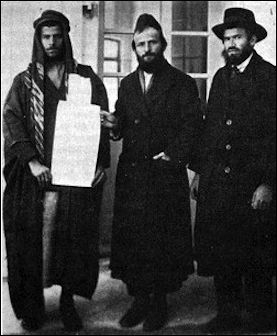
Jewish rabbis purchasing land from an Arab landowner (left), 1920s. In Mandate Palestine, ordinary Arabs were persecuted and murdered by their alleged betters for the crime of “selling Palestine” to the Jews. Meanwhile, these same betters were enriching themselves with impunity. Many prominent leaders made a handsome profit by selling land to Jews.
In Mandate Palestine, ordinary Arabs were persecuted and murdered by their alleged betters for the crime of “selling Palestine” to the Jews. Meanwhile, these same betters were enriching themselves with impunity. The staunch pan-Arabist Awni Abdel Hadi, who vowed to fight “until Palestine is either placed under a free Arab government or becomes a graveyard for all the Jews in the country,”[25] facilitated the transfer of 7,500 acres to the Zionist movement, and some of his relatives, all respected political and religious figures, went a step further by selling actual plots of land. Many prominent leaders including Muin Madi, Alfred Rock, and As’ad Shuqeiri (father of Ahmad, PLO founder) also sold land. Musa Alami, who bragged to David Ben-Gurion that “he would prefer the land to remain poor and desolate even for another hundred years” if the alternative was its rapid development in collaboration with the Zionists,[26] made a handsome profit by selling 225 acres to the Jews. So, too, did numerous members of the Husseini family, the foremost Palestinian Arab clan during the mandate period, including Musa Kazim (father of Abdel Qader Husseini, the famous guerrilla leader) and Muhammad Tahir, Hajj Amin’s father.[27]
Hajj Amin himself had few qualms about profiting from the Jewish national revival, which he sought to eradicate whenever this suited his needs. Prior to his appointment as the Jerusalem mufti, he pleaded with Jewish leaders to lobby on his behalf with (the Jewish) Herbert Samuel, the first British high commissioner for Palestine, and in 1927, he asked Gad Frumkin, the only Jewish Supreme Court justice during the mandatory era, to influence Jerusalem’s Jewish community to back the Husseini candidate in the mayoral elections. He likewise employed a Jewish architect to build a luxury hotel for the Supreme Muslim Council, which he headed, while ordering his constituents to boycott Jewish labor and products.[28] Needless to say, the mufti never sought to apply to his own father his religious authorization (fatwa) on the killing of those who sold land to Jews.
“Arab nationalist feelings were never allowed to harm the interests of the Husseini family,” wrote the prominent Jerusalem lawyer and Zionist activist Bernard (Dov) Joseph, a future minister of justice in the Israeli government:
One of [the mufti’s] kinsmen, Jamil Husseini, had once engaged my services in land litigation which went as high as the Privy Council in London … For years, one of the Mufti’s close relations prospered mightily by forcing Arab small-holders to sell land, at niggardly prices, which he then resold to Jews at a handsome profit.[29]
This institutionalized racketeering skyrocketed to new heights under the PLO. Just as the Palestinian leadership during the mandate had no qualms about inciting its constituents against Zionism and Jews while lining its own pockets from the fruits of Jewish development and land purchases, so the cynical and self-seeking PLO “revolutionaries” used the billions of dollars donated by the Arab oil states and the international community to lead a luxurious lifestyle in sumptuous hotels and villas, globe-trotting in grand style, acquiring properties, and making financial investments worldwide — while millions of ordinary Palestinians scrambled for a livelihood.
This process reached its peak following the September 1993 signing of the Israel-PLO Declaration of Principles on Interim Self-government Arrangements (DOP, or Oslo I) and the establishment of the Palestinian Authority. For all his rhetoric about Palestinian independence, Arafat had never been as interested in the attainment of statehood as in the violence attending its pursuit. In the late 1970s, he told his close friend and collaborator, the Romanian dictator Nicolae Ceausescu, that the Palestinians lacked the tradition, unity, and discipline to become a formal state, and that a Palestinian state would be a failure from the first day.[30] Once given control of the Palestinian population in the West Bank and Gaza as part of the Oslo process, he made this bleak prognosis a self-fulfilling prophecy, establishing a repressive and corrupt regime in the worst tradition of Arab dictatorships where the rule of the gun prevailed over the rule of law and where large sums of money donated by the international community for the benefit of the civilian Palestinian population were diverted to funding racist incitement, buying weaponry, and filling secret bank accounts. Extensive protection and racketeering networks run by PA officials proliferated while the national budget was plundered at will by PLO veterans and Arafat cronies (in May 1997, for example, the first-ever report by the PA’s comptroller stated that $325 million, out of the 1996 budget of $800 million had been “wasted” by Palestinian ministers and agencies or embezzled by officials).[31]
Arafat himself held a secret Tel Aviv bank account accessible only to him and his personal advisor Muhammad Rashid, in which he insisted that Israel deposit the tax receipts collected on imports to the Palestinian territories (rather than transfer them directly to the PA). In 1994-2000, nearly eleven billion shekels (about US$2.5 billion) were reportedly paid into this account, of which only a small, unspecified part reached its designated audience.[32] Small wonder that, in 2004, the French authorities opened a money-laundering inquiry into suspect regular transfers into the Paris bank accounts held by Arafat’s wife Suha, who resided there with their daughter. After Arafat’s death, Suha was reportedly promised an annual pension of $22 million to cover her sumptuous lifestyle, paid from an alleged $4 billion “secret fortune” managed personally by the PA president and kept in a number of bank accounts in Tel Aviv, London, and Zurich.[33]
Though this breathtaking corruption played an important role in Hamas’s landslide electoral victory of January 2006, the PLO/PA leadership seems to have learned nothing and to have forgotten nothing. Not only did Abbas, who succeeded Arafat as PLO chairman and PA president, blatantly ignore the results of the only (semi) democratic elections in Palestinian history — establishing an alternative government to the legally appointed Hamas government and refusing to hold new elections upon the expiry of his presidency in January 2009 — but he seems to have followed in his predecessor’s kleptocratic footsteps, reportedly siphoning at least $100 million to private accounts abroad and enriching his sons at the PA’s expense.[34] In the words of Fahmi Shabaneh, former head of the Anti-Corruption Department in the PA’s General Intelligence Service:
In his pre-election platform, President Abbas promised to end financial corruption and implement major reforms, but he hasn’t done much since then. Unfortunately, Abbas has surrounded himself with many of the thieves and officials who were involved in theft of public funds and who became icons of financial corruption. … Some of the most senior Palestinian officials didn’t have even $3,000 in their pocket when they arrived [after the signing of the Oslo accords]. Yet we discovered that some of them had tens, if not hundreds, of millions of dollars in their bank accounts. … Had it not been for the presence of the Israeli authorities in the West Bank, Hamas would have done [there] what they did in the Gaza Strip. It’s hard to find people in the West Bank who support the Palestinian Authority. People are fed up with the financial corruption and mismanagement of the Palestinian Authority.[35]
Conclusion
For nearly a century, Palestinian leaders have missed no opportunity to impede the development of Palestinian civil society and the attainment of Palestinian statehood. Had Hajj Amin Husseini chosen to lead his constituents to peace and reconciliation with their Jewish neighbors, the Palestinians would have had their independent state over a substantial part of mandate Palestine by 1948, if not a decade earlier, and would have been spared the traumatic experience of dispersal and exile. Had Arafat set the PLO from the start on the path to peace and reconciliation instead of turning it into one of the most murderous and corrupt terrorist organizations in modern times, a Palestinian state could have been established in the late 1960s or the early 1970s; in 1979, as a corollary to the Egyptian-Israeli peace treaty; by May 1999, as part of the Oslo process; or at the very latest, with the Camp David summit of July 2000. Had Abbas abandoned his predecessors’ rejectionist path, a Palestinian state could have been established after the Annapolis summit of November 2007, or during President Obama’s first term after Benjamin Netanyahu broke with the longstanding Likud precept by publicly accepting in June 2009 the two-state solution and agreeing to the establishment of a Palestinian state.
But then, the attainment of statehood would have shattered Palestinian leaders’ pan-Arab and Islamist delusions, not to mention the kleptocratic paradise established on the backs of their long suffering subjects. It would have transformed the Palestinians in one fell swoop from the world’s ultimate victim into an ordinary (and most likely failing) nation-state thus terminating decades of unprecedented international indulgence. It would have also driven the final nail in the PLO’s false pretense to be “the sole representative of the Palestinian people” (already dealt a devastating blow by Hamas’s 2006 electoral rout) and would have forced any governing authority to abide, for the first time in Palestinian history, by the principles of accountability and transparency. Small wonder, therefore, that whenever confronted with an international or Israeli offer of statehood, Palestinian leaders would never take “yes” for an answer.
Efraim Karsh, editor of the Middle East Quarterly, is professor of Middle East and Mediterranean studies at King’s College London and professor of political studies at Bar-Ilan University where he is also a senior research associate at the BESA Center for Strategic Studies. This article is part of a wider study prepared under the auspices of the BESA Center.
![]()
Notes:
[1] Daniel Pipes, “Palestine for the Syrians?” Commentary, Dec. 1986.
[2] Jamal Husseini, “Report of the State of Palestine during the Four Years of Civil Administration, Submitted to the Mandate’s Commission of the League of Nations through H.E. the High Commissioner for Palestine, by the Executive Committee of the Palestine Arab Congress—Extract,” Oct. 6, 1924, Central Zionist Archive (CZA, Jerusalem), S25/10690, p. 1.
[3] “Minutes of the Ninth Session, Held at Geneva from June 8th to 25th, 1926, including the Report of the Commission to the Council,” 22nd meeting, Permanent Mandates Commission, League of Nations, June 22, 1926.
[4] “The Arabs Reject Partition,” quoted from Palestine & Transjordan, July 17, 1937, p. 1, CZA; “Minutes of the JAE Meeting on Apr. 19, 1937,” Ben-Gurion Archive (Sde Boker).
[5] The New York Times, Aug. 25, 1947.
[6] The Ambassador in Turkey to the Foreign Ministry (Enclosure), July 6, 1940, Documents on German Foreign Policy 1918-1945 (London: HMSO, 1949), ser. D, vol. 10, pp. 143-4; The Grand Mufti to Adolf Hitler, Jan. 20, 1941, ibid., ser. D, vol. 11, pp. 1151-5; Record of the Conversation between the Führer and the Grand Mufti of Jerusalem on Nov. 28, 1941, in the Presence of Reich Foreign Minister and Minister Grobba in Berlin, Nov. 30, 1941, ibid., pp. 881-5.
[7] Ghada Hashem Talhami, Syria and the Palestinians: The Clash of Nationalisms (Gainesville: University Press of Florida, 2001), pp. 49-50.
[8] “Excerpts from Statements in the U.N. on Mideast,” The New York Times, June 1, 1956; “Syria Says in U.N. Palestine Is Hers,” ibid.
[9] The Palestinian National Charter, Resolutions of the Palestine National Council, July 1-17, 1968, art. 13-14; see, also, art. 11, 12, 15.
[10] Daniel Pipes, “Declaring Independence: Israel and the PLO,” Orbis, Mar. 1989, pp. 247-60.
[11] “Declaration of Independence (1988),” website of the “State of Palestine.”
[12] Ari Shavit, “Ha’ezrah Azmi,” Haaretz (Tel Aviv), Nov. 25, 2002; Bishara on Israeli Channel 2 TV, n.d., YouTube.
[13] 2003 Permanent Constitution Draft, Palestinian Basic Law, chap. 1, art. 2, May 4, 2003.
[14] See, for example, statements by Fatah’s official spokesman Ahmad Assaf on official PA TV and Egyptian TV, Mar. 19, 2014, “Fatah Spokesman: Israel’s goal is to rule ‘from the Euphrates to the Nile,'” Palestinian Media Watch (Jerusalem), Mar. 23, 2014.
[15] Haaretz, Mar. 26, 2014.
[16] “Exclusive Interview with Hamas Leader,” The Media Line, Sept. 22, 2005; Walid Mahmoud Abdelnasser, The Islamic Movement in Egypt: Perceptions of International Relations, 1967-81 (London: Kegan Paul, 1994), p. 39.
[17] Zahar’s interview with Asharq al-Awsat (London), Aug. 18, 2005, in Special Dispatch, no. 964, Middle East Media Research Institute (MEMRI, Washington, D.C.), Aug. 19, 2005.
[18] “Hamas Covenant,” Yale Law School, Avalon Project, art. 10.
[19] Ibid., art. 8.
[20] Ibid., art. 11, 15.
[21] Gilles Kepel, Jihad: The Trail of Political Islam (Cambridge: Harvard University Press, 2002), p. 306; Michel Gurfinkiel, “Islam in France: The-French Way of Life Is in Danger,” Middle East Quarterly, Mar. 1997; The Observer (London), Nov. 4, 2001; Anthony Browne, “The Triumph of the East,” The Spectator (London), July 24, 2004.
[22] Mash’al’s address, al-Murabit Mosque, Damascus, aired on Aljazeera TV (Doha), Feb. 3, 2006, in “Special Dispatch No. 1087,” MEMRI, Feb. 7, 2006.
[23] 2003 Permanent Constitution Draft, chap. 1, art. 5, 7.
[24] Palestinian Authority TV, May 13, 2005, Palestinian Media Watch.
[25] “Conversation with Awni Abdel Hadi,” June 3, 1920, Hagana Archive (Tel Aviv), 80/145/11.
[26] David Ben-Gurion, My Talks with Arab Leaders (Jerusalem: Keter, 1972), pp. 15-6.
[27] Kenneth W. Stein, The Land Question in Palestine, 1917-1939 (Chapel Hill: University of North Carolina Press, 1984), pp. 182, 228-39.
[28] Gad Frumkin, Derekh Shofet Beyerushalaim (Tel Aviv: Dvir, 1956), pp. 216, 280-90; Eliahu Elath, Shivat Zion Vearav (Tel Aviv: Dvir, 1974), p. 245; Yehuda Taggar, The Mufti of Jerusalem and Palestine: Arab Politics, 1930-1937 (New York and London: Garland, 1986), p. 83.
[29] Dov Joseph, The Faithful City: The Siege of Jerusalem, 1948 (New York: Simon and Schuster, 1960), p. 194.
[30] Ion Pacepa, Red Horizons. Inside the Romanian Secret Service—The Memoirs of Ceausescu’s Spy Chief (London: Coronet Books, 1989), p. 28.
[31] Agence France-Presse, May 24, July 30, 1997; Khaled Abu Toameh, “Money down the Drain?” Jerusalem Report, Jan. 8, 1998, p. 26; Ronen Bergman, Veharashut Netuna (Tel Aviv: Yediot Ahronot, 2002), p. 156.
[32] Ehud Ya’ari, “The Independent State of Arafat,” Jerusalem Report, Sept. 5, 1996, pp. 22-3; Bergman, Veharashut Netuna, pp. 113-41; Rachel Ehrenfeld, “Where Does the Money Go? A Study of the Palestinian Authority,” American Center for Democracy, New York, Oct.1, 2002, pp. 7-10; Said Aburish, Arafat: From Defender to Dictator (London: Bloomsbury, 1998), p. 306.
[33] Ynet (Tel Aviv), Aug. 16, 2006; Sydney (Aus.) Morning Herald, Feb. 13, 2004.
[34] Jonathan Schanzer, “Chronic Kleptocracy: Corruption within the Palestinian Political Establishment,” Hearing before U.S. House Committee on Foreign Affairs Subcommittee on the Middle East and South Asia, Washington, D.C., July 10, 2012, pp. 17-8; Bergman, Veharashut Netuna, pp. 162-3; Ehrenfeld, “Where Does the Money Go?” pp. 9-10; Yediot Ahronot (Tel Aviv), July 14, 2002.
[35] The Jerusalem Post, Jan. 29, 2010.



 RSS
RSS



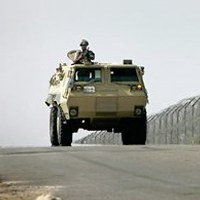
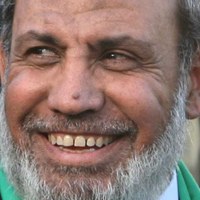
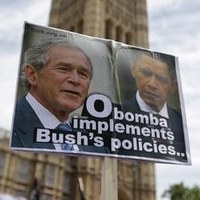




Latest Comments
Hello Mike, Thank you for your positive feedback to the article. I felt there wasn’t too much critical analysis of ...
Thanks for this considered and well constructed article. A follow up article on the manner in which the editorial contro...
THE CLUELESSNESS OF CLAIMING THAT OBAMA'S MIDDLE EAST POLICIES WERE A FAILURE CANNOT BE FURTHER FROM THE TRUTH, WHAT THE...
As long as Obama is the president of the usa do not trust the us government......
Thank you for an good read....